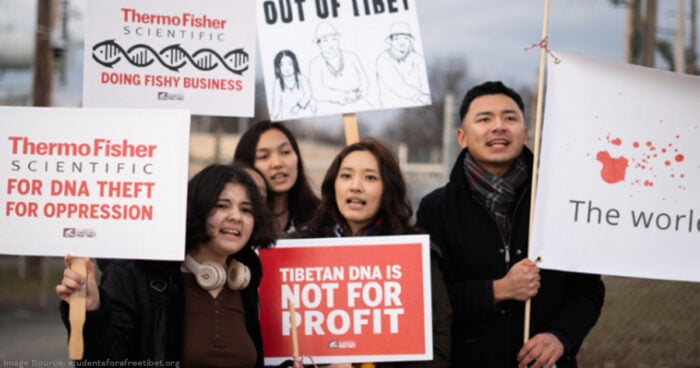
In a victory for Tibet activists, biotechnology firm Thermo Fisher Scientific says it has stopped selling kits reportedly used for mass DNA collection in a region of Chinese-occupied Tibet.
“Based on a number of factors we made the decision in mid-2023 to cease sales of [human identification] products in the region and no longer sell our human identification technology in the Tibet Autonomous Region,” a spokesperson for the Boston-based company told Axios.
According to reports, China’s police collected DNA from about 1 million residents of the Tibet Autonomous Region, which spans roughly half of Tibet.
China has illegally occupied Tibet for 65 years, turning it into the least-free country on Earth alongside South Sudan and Syria, according to the watchdog group Freedom House.
Thermo Fisher’s statement that it has stopped selling its DNA collection kits in the TAR follows a year of heavy campaigning by Tibet activists, including the groups Students for a Free Tibet, Free Tibet and the International Tibet Network.
The International Tibet Network said today that Thermo-Fisher sent a letter to shareholders last month stating that it would halt all direct and indirect sales of human identification products to Tibet.
“The International Campaign for Tibet welcomes this news of Thermo Fisher halting its DNA collection kit sales in the TAR,” ICT President Tencho Gyatso said. “This is a victory that shows collective activism for Tibet makes a real difference. Now we must go further, from pressuring businesses to end their complicity in China’s human rights abuses against Tibetans, to pushing the Chinese government to resolve its decades-long occupation of Tibet through peaceful dialogue with Tibetan leaders.”
Mass DNA collection in Tibet
In September 2022, Citizen Lab reported that China’s police may have gathered about 920,000 to 1.2 million DNA samples in the Tibet Autonomous Region over the prior six years. Those figures represent one-quarter to one-third of the region’s total population.
That same month, Human Rights Watch said that China’s authorities were systematically collecting DNA from residents of the TAR, including by taking blood from children as young as 5 without their parents’ consent.
According to Citizen Lab, China’s DNA collection program is unrelated to criminal justice. “[O]ur analysis indicates that for years police across Tibet have collected DNA samples from men, women, and children, none of whom appear to be criminal suspects,” Citizen Lab says in its report.
Police were also not targeting specific groups like activists or government critics. Instead, they were collecting DNA from entire communities.
Human Rights Watch says in its report that, “There is no publicly available evidence suggesting people can decline to participate” in the DNA collection.
US officials
US government officials have spoken up forcefully about China’s mass DNA collection in Tibet.
At Freedom House’s annual Freedom Awards in May 2023, Secretary of State Antony Blinken said: “We’re also concerned by reports of the spread of mass DNA collection to Tibet as an additional form of control and surveillance over the Tibetan population.”
Under Secretary of State Uzra Zeya, who serves as the US Special Coordinator for Tibetan Issues, said in 2022 that she was “[d]eeply disturbed” by the reports of mass DNA collection in Tibet.
“We call on the [People’s Republic of China] to stop these repressive policies and respect the fundamental freedoms of Tibetans,” Zeya said on social media.
In October 2023, the bipartisan chairs of the Congressional-Executive Commission on China wrote to Blinken, Secretary of Commerce Gina Raimondo and Secretary of the Treasury Janet Yellen, urging them to take action, including possibly imposing Global Magnitsky sanctions, over China’s mass biometric data collection in Tibet, as well as its separation of over 1 million Tibetan children from their families at state-run boarding schools.
Tibetan activism
Much of the credit for Thermo Fisher’s decision to stop selling DNA kits in the Tibet Autonomous Region goes to Tibetan activists, including those at Students for a Free Tibet, the International Tibet Network, Free Tibet and others.
Starting in late 2022, Tibet groups carried out global demonstrations at Thermo Fisher offices, including huge rallies in Boston during the company’s annual general meeting in May 2023.
These groups also worked with Thermo Fisher shareholders, building a coalition that helped lead to Thermo Fisher halting the DNA collection kit sales.
The International Campaign for Tibet joined to support these groups to address the mass DNA collection with US officials and to encourage them to take action.
During a March 2023 hearing on Capitol Hill about human rights in Tibet, ICT Chairman Richard Gere called for putting in place “concrete restrictions for technology transfer or other US company support for forced/coerced DNA or other medical data collection.”
ICT also sent a letter to House members in 2022 encouraging them to support Tibet-related portions of the America Competes Act, which called for export controls of items used in human rights abuses involving DNA sequencing.
In addition, ICT researchers spoke with the Commerce Department’s foreign policy division of the Office of Nonproliferation and Treaty Compliance, Bureau of Industry and Security, to inform them about the mass DNA collection program in Tibet, including the companies and Chinese officials involved.

